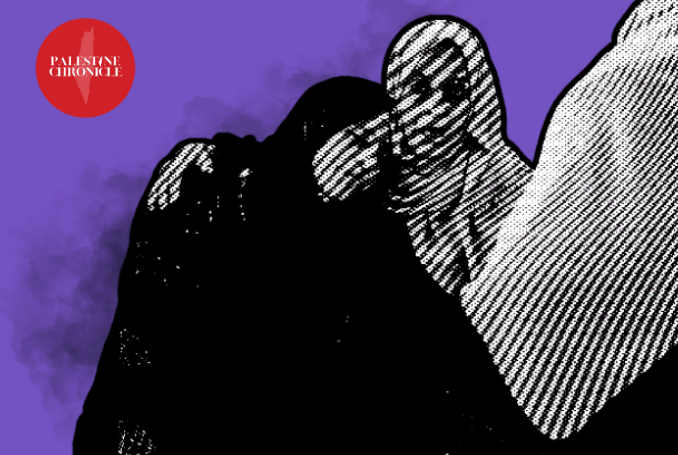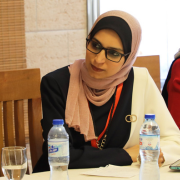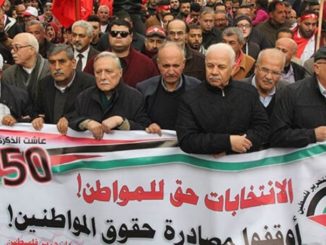
By Shaimaa Eid
Puberty is one of the most challenging phases in any girl’s life, and this is a reality many displaced girls in Gaza are facing, but R.’s case is more complex.
In one of the displacement camps in Al-Mawasi, Khan Yunis, southern Gaza Strip—where the sounds of bombing and drones drown out all else—13-year-old R. al-Ustaz faced a new and life-changing experience, one her mother wished had waited until after the war.
R., born with Down syndrome, lived a simple, sheltered life in her family home in Al-Zahra, central Gaza. But when war erupted, everything changed overnight.
The morning of April 1st is forever etched in her mother’s memory. As the sound of a nearby explosion rang out, R. came running—her clothes stained with blood. “Her heart was pounding,” her mother recalled. “She clung to me, terrified by the blood on her clothes. She thought she had been injured by the bombing.”
That moment marked the beginning of a different kind of battle, added to the daily struggles of displacement, loss of privacy, and the constant trauma of war.
“After the initial panic, I began to realize what had happened,” her mother said. “My daughter had just started her first period. I gasped—how would I explain this to her? Would she understand? How could I manage this difficult moment without the basic supplies or resources?”
R.’s mother tried to contact the psychological counselor who had been following her daughter’s case before the war, seeking guidance on how to communicate this change in a simple and comforting way. But her attempts were in vain.
Left on her own, she took a gentle, spontaneous approach. “I told her, ‘R., you’re becoming a young woman now. You’re even more beautiful. This happened because you’re growing up’.” But R. remained anxious and confused, asking repeatedly, “Am I wounded?”
Since then, R. has been deeply unsettled. Her questions haven’t stopped, and she continues to seek answers in an environment that offers few.
Psychologist and social worker Oroub Jumlah emphasized that puberty is one of the most challenging phases in any girl’s life, whether they have Down syndrome or not. “This critical stage requires a sensitive and supportive approach from families, especially mothers, because of the emotional and social challenges it brings,” she told The Palestine Chronicle.
“She needs special care in this new phase of her life,” her mother said. “But in the middle of a war, it’s impossible to provide even the most basic necessities—especially sanitary pads and clean water.”
This is a reality many displaced girls in Gaza are facing, but R.’s case is more complex. “She doesn’t understand what’s happening,” her mother explained, “and she can’t express her needs clearly.”
Holding her daughter close, she added, “Children with Down syndrome have very weak immune systems. Even a minor infection can lead to serious illness. I’ve been fighting to bring her clean water just to keep her safe and calm. I made a promise to myself to help her through this challenge.”
In one instance, they received a package of sanitary pads from a charitable organization that responded to the mother’s plea. “I was overjoyed,” she said. “It felt like a breakthrough, like a door had opened.”
Psychologist and social worker Oroub Jumlah emphasized that puberty is one of the most challenging phases in any girl’s life, whether they have Down syndrome or not. “This critical stage requires a sensitive and supportive approach from families, especially mothers, because of the emotional and social challenges it brings,” she told us.
Jumlah highlighted the importance of helping girls feel safe during this vulnerable time. “A mother’s warm embrace and emotional support are key to helping a girl navigate this phase smoothly,” she said.
She stressed the need to prepare girls ahead of time to understand physical changes, like menstruation, using calm and reassuring language.
“Mothers should help their daughters feel that it’s a normal part of growing up and encourage them to speak up when it happens. Emotional closeness is crucial at this stage.”
Jumlah also warned of the importance of protecting young girls from exploitation and educating them, clearly and simply, on how to safeguard their bodies and respond to uncomfortable situations.
“No one can replace the psychological safety a mother provides,” she added. “Unconditional love, a constant smile, and a warm embrace help a girl feel secure and grounded.”
Regarding girls with Down syndrome, she said, “They are especially attuned to affection and tenderness. This makes a mother’s care and the love of the family essential to their wellbeing and engagement with life.”
Finally, she stressed the importance of maintaining personal hygiene during this stage of development.
“Despite the difficult conditions mothers are facing in Gaza, dedicating time and effort to care for and guide their daughters remains an indispensable necessity.”
(The Palestine Chronicle)

– Shaimaa Eid is a Gaza-based writer. She contributed this article to the Palestine Chronicle.








The ZioNazis are very good at psychological terrorism. Unfortunately they learned much of what they know from my US government. Inherent dehumanization has been a thing for decades. We are also dehumanized when we stand up and say, ” stop stealing our money, and giving it to the terrorists occupying Palestine ” , we’re punished for saying the Israeli Zionists are terrorists, when it’s as plain as day. How anyone can side with Wasrael is beyond me.
” From the river to the sea, Palestine will be free ” …